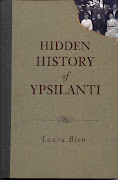Jas. Haddon, of Dowagiac, is the heaviest bee-keeper in Michigan, owning over 400 swarms.
Thomas Mason, an employe in T. Nestin's lumber camp, at Sugar Creek, drank a pint of salt and water for biliousness and died very suddenly.
Benj. Collins has been arrested, near Vermontville, for sowing foul seed, chess, cockle, dock, etc., in the night, on the wheat field of his stepson.
Annie Cook, of Memphis, who turned her elegant demi-monde establishment into a yellow fever hospital and devoted herself to the nursing of the patients, has fallen a victim to the fatal scourge.
The only daughter of a widow, Mrs. Seneca Hicks, of Kalamazoo, became a mother before she became a wife, and the body of the babe was found in the cellar, murdered. Mrs. Hicks has been arrested [and] charged with the murder. She refuses to make any statement in regard to the matter as yet.
Some time ago one Herman Sims was suspected of burning a barn at or near Bay City. Since that he disappeared and on Saturday his body was found hanging by the neck to a tree near Kawkawlin, where it had evidently hung for many days. It is not clear whether it is a case of suicide or lynching.
Sitting Bull has sent emissaries to inquire upon what terms his people will be permitted to return to the United States territory. Gen. Sheridan has telegraphed that we are not especially anxious about the Indians who went North to come back, but if ithey do come back it must be on terms of unconditional surrender.
IN HASTE---The steeple painter departed without saying good-bye to Mr. A. P. Bucklin, with whom he boarded, or Mr. Frank Smith, from whom he obtained his paints; and so those gentlemen, accompanied by a sheriff, went to Detroit to pay their adieus to the decorator of our city spires. They returned without finding him. Total loss, $50.
Considerable excitement was created at Cincinnati by the discovery of an aged lady who had died in the hospital, and was supposed to have been buried in the potter's field, had not been buried there. Friends desiring to remove the remains to Spring Grove found the empty coffin only, which had contained no body, the latter having been removed before burial.
Among those who have entered the Dental Department of the University is Mrs. Alma Fuellgraf, of Elmshorn, Prussia. She came to this country a few weeks since and had intended to go to Philadelphia and continue her studies. She however met some Americans on the boat, and was so pleased with the information she received from them as to Michigan University that she decided to come here. One of the matriculants in the Medical Department is Myatt Kyan, of Rangoon, Burmah. --Ann Arbor Register
 "George Crum, from Ypsilanti, who had defrauded the Ann Arbor grocers out of provision to feed the hungry fair-goers, was allowed to hunt for bail. In order to make a systematic search he and his family left Ypsilanti last Friday, and they are now probably grubbing for a pot of gold about the roots of the twining woodbine.--[Ypsilanti] Commercial.
"George Crum, from Ypsilanti, who had defrauded the Ann Arbor grocers out of provision to feed the hungry fair-goers, was allowed to hunt for bail. In order to make a systematic search he and his family left Ypsilanti last Friday, and they are now probably grubbing for a pot of gold about the roots of the twining woodbine.--[Ypsilanti] Commercial.



























































